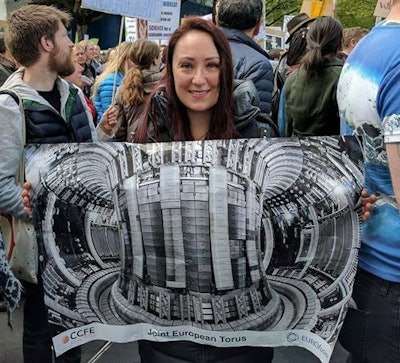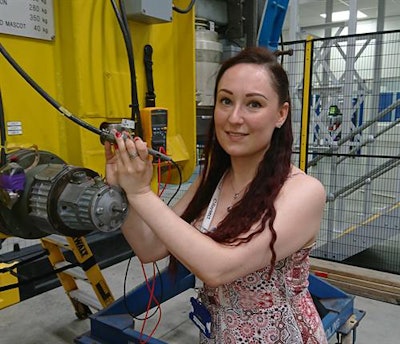
Deep concerns are emerging among imaging and oncology specialists that Brexit and the U.K.'s subsequent withdrawal from the European Atomic Energy Community (Euratom) treaty will have a huge impact on nuclear medicine services. Unless issues are resolved soon, cancer patients will suffer, they say.
Radioactive isotopes play a crucial role in cancer diagnosis and treatment. While materials for PET/CT scanning are manufactured in the U.K., the rest of the country's radioisotope supply is imported from Europe and other regions, the Royal College of Radiology (RCR) noted in a statement issued on 10 July.
 RCR President Dr. Nicola Strickland.
RCR President Dr. Nicola Strickland."The Royal College of Radiologists, like others in medicine and industry, is seriously concerned about continued access to these materials if we leave the Euratom treaty under Brexit," RCR President Dr. Nicola Strickland stated.
What leaving Euratom might actually mean in practical terms is uncertain. Officials have given general assurances that they will consult with the industry over nuclear safeguarding, according to the college.
"The RCR is adamant that they must do just that, and soon. Navigating Brexit is undoubtedly a huge task for ministers, but our access to these vital materials for diagnosing and treating cancer must not be left to slip down the negotiations list," Strickland added.
So what's the background here? And what's at stake?
At present, the U.K. belongs to Euratom, which governs the marketing and importation of medical isotopes. However, the U.K. government has announced that the country will be leaving all European institutions at the same time that it leaves the European Union (EU), and, once it does so, the former EU member will have to fill the void with new legislation, notably the Nuclear Safeguards Bill mentioned briefly in the Queen's Speech on 21 June.
The bill states that the government will establish a nuclear safeguards regime as the U.K. leaves the EU and Euratom to ensure the U.K. continues to meet its international obligations for nuclear safeguards, as applies to civil nuclear material through the International Atomic Energy Agency, and to support international nuclear nonproliferation, as well as to protect U.K. electricity supplied by nuclear power.
Alarm bells start to ring
Already, there is major concern that the government is not acting fast enough on this issue and that not all the consequences of Brexit have been considered thoroughly -- in particular, the safe and legal transit of medical isotopes from Europe to the U.K. for use in nuclear medicine.
 Dr. Richard FitzGerald, RCR's vice president of clinical radiology.
Dr. Richard FitzGerald, RCR's vice president of clinical radiology.The uncertainty is very worrying, according to Dr. Richard FitzGerald, RCR's vice president of clinical radiology.
"The impact of not having many nuclear medicine scans would turn back the clock decades for patients with cancer," he told AuntMinnieEurope.com.
In March 2017, the RCR published its various concerns about Brexit, including the need for the U.K. to continue to have access to a European licensing process for new medical treatments. This would ensure that the U.K. wouldn't fall behind in the potential treatments offered. It would avoid delays in access to such treatments for patients while helping the country to remain financially attractive to medicine and medical device manufacturers. The RCR also demanded that patients and their doctors continue to have the same level of access to clinical trials, the cornerstone of best clinical practice, through European trials governance rules.
Nuclear medicine governance also will remain a key area for RCR lobbying, FitzGerald noted. "The RCR will employ all its multistakeholder advocacy to influence a satisfactory outcome on this and other Brexit issues for radiology and clinical oncology."
Brexit goes nuclear
Nuclear medicine is used to treat about 9 million patients in Europe each year, roughly 20% of the world market, according to Alexandrine Kántor, an electrical systems design engineer at the U.K. Atomic Energy Agency.
 French citizen Alexandrine Kántor is shown here holding a poster about Euratom's Joint European Torus project aimed at investigating the safety of fusion power.
French citizen Alexandrine Kántor is shown here holding a poster about Euratom's Joint European Torus project aimed at investigating the safety of fusion power.In her recent article, "Brexit goes nuclear: The consequences of leaving Euratom," Kántor noted that the common radioisotopes used in nuclear medicine, technetium-99m (Tc-99m) and molybdenum-99 (Mo-99), decay very quickly and have respective half-lives of six hours and 66 hours. This makes storage and timely transportation to the U.K. critical, she noted, especially given that U.K. nuclear reactors can't yet produce these materials.
Potential shipment delays due to the U.K.'s retreat from Euratom could cause materials to deteriorate beyond viability and lead to delayed cancer treatments, Kántor pointed out.
"Hinkley Point C, the newest British nuclear reactor, will have the technology to produce medical radioisotopes," she stated. "It should help to address the global shortage of supplies that we currently face, including the anticipated increase in demand of 5% per annum. However, Hinkley Point C is not planned to come online until 2025, and its construction is also likely to be impacted by the decision to withdraw from Euratom."
 Kántor fears the U.K.'s decision to leave Euratom will affect the construction of Hinkley Point C, the nuclear reactor scheduled to go live in 2025.
Kántor fears the U.K.'s decision to leave Euratom will affect the construction of Hinkley Point C, the nuclear reactor scheduled to go live in 2025.Kántor also warned that easy transfer of materials to the U.K. across Europe will depend on the outcome of any renegotiation, and a risk remains that the NHS as a large user of radioisotopes would face additional costs associated with transportation.
Need for concerted efforts
Brexit's impact on nuclear medicine has been the subject of discussion at successive meetings of the Intercollegiate Standing Committee on Nuclear Medicine (ICSCNM) in March and June 2017 and several email exchanges in between, according to ICSCNM Chair Dr. Andrew Scarsbrook.
 Dr. Andrew Scarsbrook, chair of the ICSCNM.
Dr. Andrew Scarsbrook, chair of the ICSCNM."The committee noted its great concern about the potential impact of the U.K.'s withdrawal from Euratom generally and on nuclear medicine in particular. It was clear that the government was poorly prepared for the many implications of Brexit on healthcare in the U.K.," he said. "For nuclear medicine, critical legislation is enshrined in European law, and whilst there might be transitory arrangements, there is a stop-dead time before which matters have to be resolved. The impact on the supply of medical isotopes was noted as a major issue since many of these are produced outside of the U.K. and transported into the country under EU legislation."
Intense and ongoing activity by various groups working to find a solution for nuclear medicine ahead of Brexit is escalating, Scarsbrook continued. The Royal College of Physicians has formulated Brexit-related issues that require attention, and the Cavendish Coalition, a group of healthcare organizations committed to ensuring standards of care are maintained as the U.K. prepares to withdraw from the EU, has been addressing these issues in a coordinated way.
The NHS Confederation also is engaged in Brexit issues related to healthcare, while the British Nuclear Medicine Society and Public Health England, with representation on the ICSCNM, have discussed these issues internally, according to Scarsbrook. Concerns regarding radiotherapy that is governed by Euratom legislation have been escalated to the RCR's vice president of clinical oncology, Dr. Jeanette Dickson, and the National Cancer Research Institute Clinical and Translational Radiotherapy Research Working Group.
"Dr. Richard FitzGerald has also been a clear voice in turbulent times, actively highlighting issues to key stakeholders by flagging statements and publications by other groups, including the Association of Cancer Physicians," Scarsbrook said.
He also pointed to a BMJ opinion column published by Dr. Martin McKee about the impact of Brexit on healthcare. A further article covering Brexit issues by McKee, a professor of European public health at the London School of Hygiene and Tropical Medicine, is due for imminent publication in Lancet.
"Clearly, this is a very dynamic issue. Time will tell if the message has got through to the Brexit committee and if the potential issues will be ironed out in time. Let's hope so," Scarsbrook noted.
Editor's note: For coverage of this topic in the U.K. national press, follow these links to articles in the Guardian and the London Evening Standard newspapers.



















